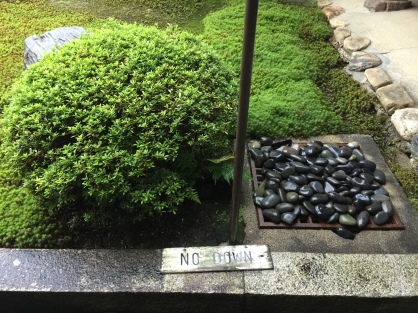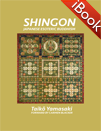“And we all got together with him, the poets, and drove in several cars to Chinatown for a big fabulous dinner off the Chinese menu, with chopsticks, yelling conversation in the middle of the night in one of those free-swinging great Chinese restaurants of San Francisco. This happened to be Japhy’s favorite Chinese restaurant, Nam Yuen, and he showed me how to order and how to eat with chop-sticks and told anecdotes about the Zen Lunatics of the Orient and had me going on glad (and we had a bottle of wine on the table) that finally I went over to an old cook in the doorway of the kitchen and asked him “Why did Bodhidharma come from the West?” (Bodhidbarma was the Indian who brought Buddhism eastward to China.) “I don’t care,” said the old cook, with lidded eyes, and I told Japhy and he said “Perfect answer, absolutely perfect. Now you know what I mean by Zen.” Jack Kerouac, Dharma Bums, 1958
The koan is designed to make the aspiring student of Rinzai Zen ponder a problem, sometimes for years. The student may go to a teacher to discuss the koan and receive advice, but like all good things, the answer usually comes from deep inside oneself.
One of the better known koans is: “Why did the patriarch (Bodhidharma) come from the West?” (趙州、因僧間、如何是祖師西來意)
This particular koan is found in two classic Chinese koan anthologies, the Blue Cliff Record and the Gateless Gate (Mumonkan):
Zhàozhõu, a monk, responds to the question: “The cypress tree in the garden.” (州云、庭前植樹子。)
Master Wúmen’s commentary follows:
“If you understand Zhàozhõu’s answer intimately, there is no Sakyamuni before you, no Maitreya to come.” (無門日、若向趙州答處見得親切、前無釋迦後無彌勒。)
The following three maxims (言無展事) are then espoused:
• words cannot express the truth (語不投機)
• speech does not convey the spirit (承言者喪)
• swayed by words, you are lost (滯句者迷)
There are many other iterations of this koan which are discussed here.
This koan, in particular, is also used as a standard teaching device, often in a ‘teisho’, or a ‘study session’ as in this Soto Zen ‘teisho’, by Shohaku Okumura.
The previous discussion ultimately leads to yet another important question: “What is the origin and purpose of koan study in classical Chinese Chan Buddhism?
Exhausted by this academic introspection, you might need a more playful explanation which thankfully is provided by TED.
And finally, perhaps the most telling explanation of this koan comes in an anecdote describing how the Bodhidharma first met the devout Buddhist emperor Wu (464-549, r. 502-549) upon entering China:
“After arriving in southern China, Bodhidharma is said to have engaged in an enigmatic exchange with the devout Buddhist emperor Wu (464-549, r. 502-549) of the Liang dynasty (502-557) on the subject of the Buddha’s teachings and merit making. To the emperor’s questions about what dharma Bodhidharma was transmitting and how much merit (puṇya (पुण्य)) he, Wudi, had made by his munificent donations to construct monasteries and ordain monks, Bodhidharma replied that the Buddha’s teachings were empty (hence there was nothing to transmit) and that the emperor’s generous donations had brought him no merit at all. The emperor seems not to have been impressed with these answers, and Bodhidharma, perhaps disgruntled by the emperor’s failure to understand the profundity of his teachings, left for northern China, taking the Yanstze river, riding a reed across the river.”
Below are some other well known koans:
• “Has a dog Buddha-Nature?”
• “What is the sound of one hand clapping?”
• “What was your face before your parents were born?”
• “After passing away, what will you need?”
• “Where has all of yesterday’s commotion gone?”
• “Clearly knowing the unborn nature of life, why are we stayed by life?”
• “The buddhas of past present and future do not know it is: cats and cows know it is.”
• “When someone who has undergone the great death then returns to life, how is it?”
• “Do people these days need enlightenment or not?”
• “When not a single thing is brought, then what?”
• “The golden fish that’s passed through the net—what does it use for food?”
• “How is it when a crane stands on a withered pine?”
• “When not producing a single thought, is there any fault or not?”
• “If you have a staff, I will give you one. If you have no staff, I will take it
away from you.”
• “Why is it that a man of great strength cannot lift up his own legs?”


